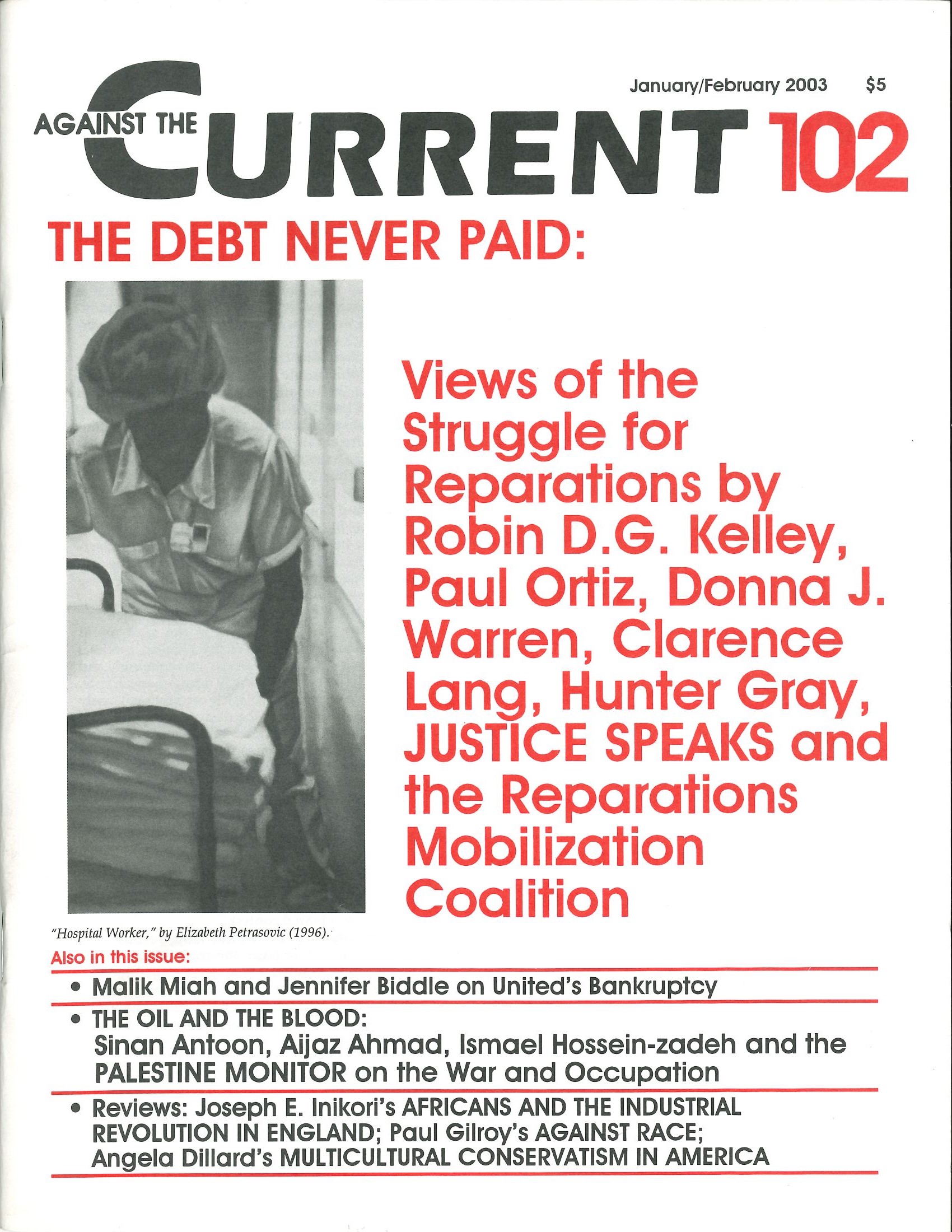Against the Current, No. 102, January/February 2003
-
War and Democrats' Panic
— The Editors -
California Grows Green with Camejo-Warren
— Michael Rubin -
The Rebel Girl: Motherhood's Contested Terrain
— Catherine Sameh -
Random Shots: We Have Met the Enemy
— R.F. Kampfer - Labor Under the Gun
-
United Airlines' Unfriendly Skies
— Malik Miah and Jennifer Biddle -
Mt. Olive: Blood on the Cucumbers
— Nick Wood -
UC Workers Take the CUE
— Claudia Horning and Claudette Begin - Confronting Bush's War
-
The Military-Industrial Empire and War
— Ismael Hossein-zadeh -
The Naivete of A Native Critic
— Sinan Antoon -
On the Invisibility of Blood
— Aijaz Ahmad -
Update: Killing Palestinians with Impunity
— Palestine Monitor - Reparations and the Black Liberation Struggle
-
For Reparations and Transformation
— Robin D.G. Kelley -
The Reparations Demand in History
— Paul Ortiz -
All Out for Millions for Reparations
— Black Workers for Justice -
Launching the Mass Reparations Campaign
— Reparations Mobilization Coalition -
Black Politics, Greens and Reparations
— Donna J. Warren -
Reparations as A New Reconstruction
— Clarence Lang -
A Native American and Civil Rights' View
— Hunter Gray - Speaking Out for Bilingual Education
-
The Battle of "English Only"
— Stephanie Luce -
Those Who Speak Two Languages Live Twice
— Karina Altagracia Bautista - Reviews
-
Abolishing Race in Theory?
— Bill Mullen -
African Labor and England's Industry
— Christopher McAuley -
Multicultural Conservatism
— Christopher Phelps - Letters to Against the Current
-
Two Blunders
— Ernie Haberkern
Catherine Sameh
THIS PAST OCTOBER, Barnard College and the Institute for American Values hosted a conference on motherhood called “Maternal Feminism: Lessons for a 21st Century Motherhood Movement,” designed to bring conservative and liberal women together to discuss the relationship of feminism to motherhood and call for a motherhood movement.
The organizers’ platform called for, among other things “a fundamental re-ordering of the priorities of our society,” “a calming in the tensions between the women’s movement and motherhood,” and a transformation of the culture “so that the values of the money world — radical individualism, relentless work, the quest for material success, and speed — yield ample room for the values of the mother world — care, connectedness, interdependence, and the other values necessary for nurturing human beings and building human relationships.”
Building a feminist movement centered around valuing the work of caring for others over the individual quest for material gain may be compelling to many women who face multiple demands from public and private life.
But the ideas behind this movement are ultimately conservative at heart and extremely limited. Compelling as it may be, a motherhood movement fails to challenge a complex capitalist system that creates such tensions and dilemmas for women to begin with.
We can build movements that challenge the hegemony of a certain kind of work life over caring and connectedness, without relying on simple and traditional notions about women and mothering.
A Seductive Appeal
Why would progressive feminists sit in a room with right-leaning family values women to call for a motherhood movement? Why is such a movement compelling to people?
At the heart of this impulse is the concern for the well-being of children and deep anxiety about our society’s inability to fully protect and nurture all people. A motherhood movement looks at the one arena where nurturing and protection are supposedly guaranteed.
The challenges to individualism, overwork, and the pursuit of material success are thoughtful and resonate with anyone who has to sacrifice family life, connectedness with others, play and leisure all to work and the culture of work.
At times, what is required to succeed in the workplace seems directly counterposed to the connectedness and care that families can provide.
A movement organized around mothers as nurturers and caregivers, however, is ultimately conservative and fails to challenge the ways our society is organized to force women and parents to make hard choices about work and family life, and to put the burden of care directly on the shoulders of women.
Building a movement around women’s identity as mothers reinforces both the notion that all women like and want to mother, and that it is individual women’s responsibility alone to care and provide for children.
Though it purports to challenge individualism, the motherhood movement could further isolate women in the home and reinforce the pressure families, and particularly women, feel to provide the nurturing and care that life under capitalism denies. The burden of care falls on private life rather than public institutions and communities.
The work of parenting — the tremendous love, patience and skill that raising children require — should be valued and rewarded by the larger culture. Challenging a culture that values profit and the pursuit of personal success over the well-being of all people is an important task, one that all radicals are engaged
in.
But the motherhood movement is steeped in highly contradictory notions because it ultimately relies on individual women and families to make up for what the larger capitalist culture rejects. It doesn’t speak to any collective solutions to solving the work/family dilemma for women, but asks women, if pressed, to choose family and parenting over work.
While some women might make that choice, most can’t — and even if they could, would they?
While it’s true that many people, many women, are overworked and required to sacrifice important parts of themselves and their lives to their work life, it’s also true that women, like men, value their work and its rewards.
ATC 102, January-February 2003

